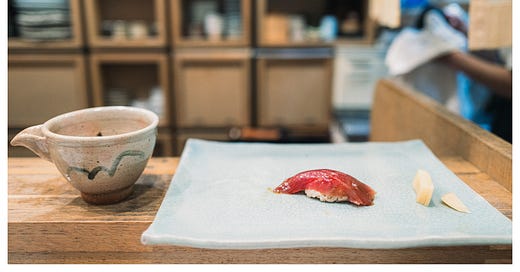From 志賀直哉「小僧の神様」
その時彼はかなり腹がへっていた。脂で黄がかった鮪の鮨が想像の眼に映ると、彼は「一つでもいいから食べてみたいものだ」と考えた。彼は前から往復の電車賃を貰うと片道を買って帰りは歩いて来る事をよくした。今も残った四銭が懐の裏隠しでカチャカチャと鳴っている。
腹が減る はらがへる to be(come) hungry
脂 あぶら fat
脂 あぶら is fat (the kind that becomes solid at room temperature), while 油 あぶら is oil (the kind that is liquid at room temperature).
鮪 まぐろ tuna
鮪 is a Japanese native character (国字). The etymology of the word まぐろ is likely 眼黒 まぐろ (as in 眼が黒い めがくろい), as tunas have black eyes.
鮨 すし sushi
鮨 is one of the many ways in which to write ‘sushi’. 寿司 is probably the most ubiquitous. 鮓 is the least common. Do not confuse with 鰭 ひれ (fin).
電車賃 でんしゃちん tram fare
往復 おうふく return (ticket)
片道 かたみち one-way (ticket)
~銭 せん (one hundreth of a yen)
隠し かくし pocket
Translation:
He felt quite hungry in that moment. As he imagined the tuna sushi glistening with a fatty golden glow, he felt he wanted to eat it, even if just one piece. Whenever he was given tram fare for a return ticket, he would often buy a one-way ticket and walk back. Now, too, the four sen he had left were clinking together in his inner breast pocket.




